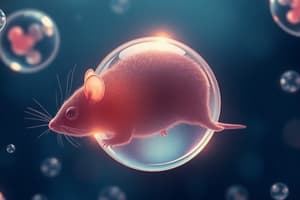Podcast
Questions and Answers
Which of the following factors is not directly related to female fertility?
Which of the following factors is not directly related to female fertility?
- Weight
- Age
- Sperm Quality (correct)
- Hormonal balance
What is the definition of secondary infertility?
What is the definition of secondary infertility?
- The inability to conceive after multiple miscarriages.
- The inability to conceive after one year of trying.
- The inability to conceive due to age-related factors.
- The inability to conceive after previous successful pregnancies. (correct)
Which of these is a common cause of infertility in women?
Which of these is a common cause of infertility in women?
- Low sperm count
- Poor sperm motility
- Abnormal sperm morphology
- Endometriosis (correct)
What percentage of infertility cases are attributed to unexplained factors?
What percentage of infertility cases are attributed to unexplained factors?
Which of these is not a fertility treatment?
Which of these is not a fertility treatment?
What is the general trend regarding male fertility as age increases?
What is the general trend regarding male fertility as age increases?
Which of these factors can negatively impact male fertility?
Which of these factors can negatively impact male fertility?
What is the role of fertility drugs in fertility treatment?
What is the role of fertility drugs in fertility treatment?
Flashcards are hidden until you start studying
Study Notes
What is Fertility?
- Fertility refers to the natural ability of an individual or couple to conceive a child.
- It involves the functioning of the reproductive system, including the production of gametes (sperm and egg cells) and the ability of these cells to fertilize.
Factors Affecting Fertility
Female Fertility
- Age: fertility declines with age, especially after 35 years old
- Ovulation: regular ovulation is essential for fertility
- Hormonal balance: hormonal imbalances can affect ovulation and fertility
- Weight: being overweight or underweight can affect fertility
- Medical conditions: certain medical conditions, such as polycystic ovary syndrome (PCOS), can affect fertility
Male Fertility
- Age: fertility declines with age, but not as sharply as in women
- Sperm quality: low sperm count, abnormal sperm morphology, and poor sperm motility can affect fertility
- Hormonal balance: hormonal imbalances can affect sperm production
- Lifestyle factors: smoking, excessive alcohol consumption, and certain medications can affect fertility
Infertility
- Infertility is defined as the inability to conceive after one year of regular, unprotected sex
- Primary infertility: refers to individuals who have never conceived
- Secondary infertility: refers to individuals who have previously conceived but are unable to conceive again
Causes of Infertility
- Female factors: 40-50% of infertility cases
- Ovulation disorders (25-30%)
- Tubal damage or blockage (20-30%)
- Endometriosis (10-20%)
- Uterine or cervical abnormalities (5-10%)
- Male factors: 30-40% of infertility cases
- Low sperm count (30-40%)
- Abnormal sperm morphology (20-30%)
- Poor sperm motility (10-20%)
- Unexplained infertility: 10-20% of infertility cases
- Combined male and female factors: 10-20% of infertility cases
Fertility Treatments
- Medications: fertility drugs to stimulate ovulation or improve sperm quality
- Intrauterine insemination (IUI): placing sperm directly into the uterus
- In vitro fertilization (IVF): combining sperm and egg cells in a laboratory dish
- Assisted reproductive technology (ART): includes IVF, IUI, and other technologies to aid conception
Definition of Fertility
- Natural ability to conceive a child
- Involves reproductive system functions, including gamete production and fertilization ability
Factors Affecting Fertility
Female Fertility
- Age: Notable decline in fertility begins after age 35
- Ovulation: Regular ovulation is crucial for conception
- Hormonal Balance: Imbalances can disrupt ovulation and reduce fertility
- Weight: Both underweight and overweight conditions can impair fertility
- Medical Conditions: Disorders like polycystic ovary syndrome (PCOS) can negatively impact fertility
Male Fertility
- Age: Gradual decline in fertility with age, but less pronounced than in women
- Sperm Quality: Affects include low sperm count, abnormal morphology, and motility issues
- Hormonal Balance: Imbalances can limit sperm production
- Lifestyle Factors: Smoking, excessive drinking, and certain medications can decrease fertility
Infertility
- Defined as the inability to conceive after one year of regular, unprotected intercourse
- Primary Infertility: Individuals who have never conceived
- Secondary Infertility: Individuals who have conceived previously but cannot conceive again
Causes of Infertility
- Female Factors: Contribute to 40-50% of infertility cases
- Ovulation disorders: 25-30%
- Tubal damage/blockage: 20-30%
- Endometriosis: 10-20%
- Uterine/cervical abnormalities: 5-10%
- Male Factors: Account for 30-40% of infertility cases
- Low sperm count: 30-40%
- Abnormal sperm morphology: 20-30%
- Poor sperm motility: 10-20%
- Unexplained Infertility: Accounts for 10-20% of cases
- Combined Factors: Both male and female factors contribute to 10-20% of cases
Fertility Treatments
- Medications: Fertility drugs used to induce ovulation or enhance sperm quality
- Intrauterine Insemination (IUI): Direct placement of sperm into the uterus
- In Vitro Fertilization (IVF): Fertilization occurs in a lab dish
- Assisted Reproductive Technology (ART): Encompasses IVF, IUI, and similar techniques to support conception
Studying That Suits You
Use AI to generate personalized quizzes and flashcards to suit your learning preferences.



